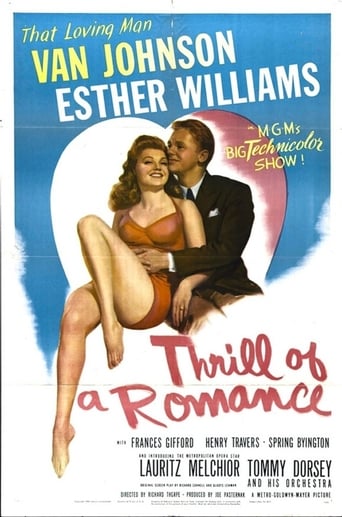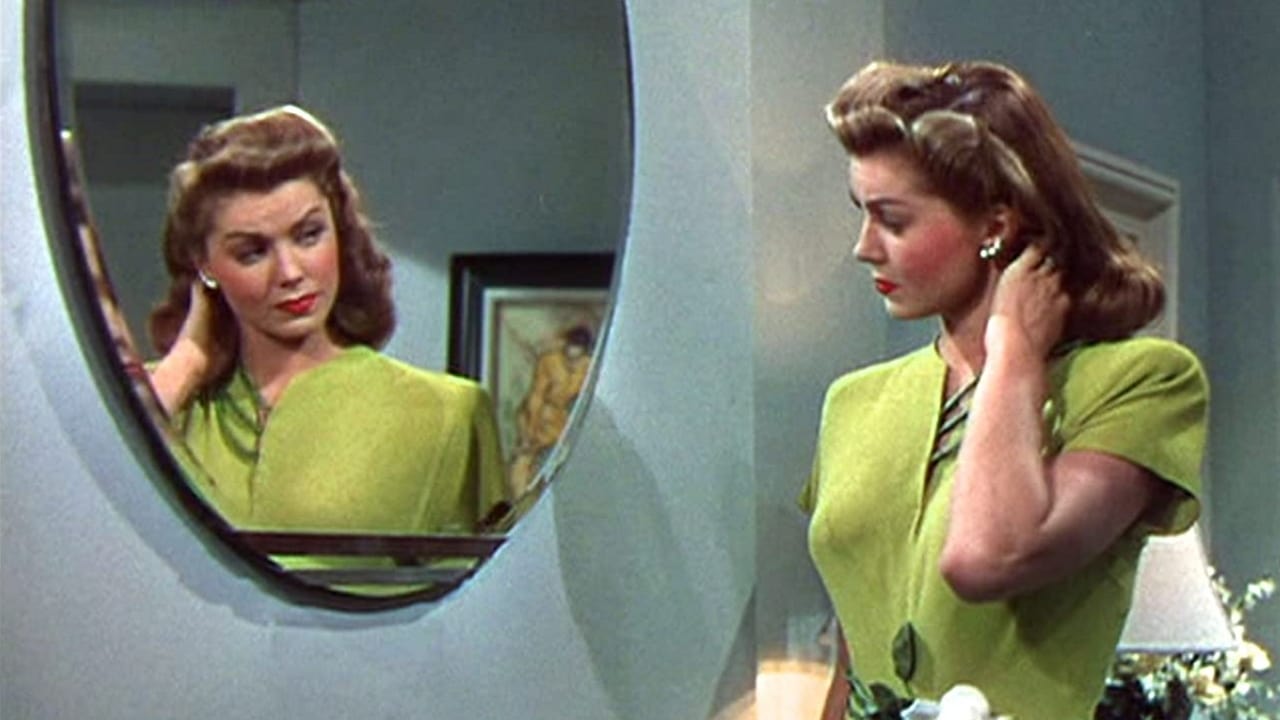TheLittleSongbird
A lot of talent displayed in 'Thrill of a Romance', and while there are many pleasures the film overall is a mixed bag and one of Esther Williams' weaker films.The problem does not lie with Williams, she has a lot of charm and robustness to her performance, looks luminous and proves herself as ever a superb swimming athlete. Nor with her aquatic sequences, part of you wishes there were more and there are more imaginative ones in her other films but they are still beautifully filmed, elegant, fun and performed with envious poise and energy by Williams.Can't say anything bad about the production values, 'Thrill of a Romance' is beautifully filmed and the Technicolor is exquisite. The music, with the bonuses too of being performed by the likes of the orchestras of Tommy Dorsey and Xavier Cugat (with Buddy Rich providing a killer drum solo), are a great mix of classical music (Schubert's "Standchen" and "Vesti La Giubba" from 'Pagliacci' notable) and songs written for the film, the hits being "I Should Care" and "Please Don't Say No, Say Maybe".Henry Travers and Spring Byington are marvellously dotty, and one wishes there were more of them, and Wagnerian tenor Lauritz Melchior is in resplendent voice and lightens up the screen with his smile and cheeky but well-intentioned charm especially.Van Johnson, on the other hand, despite a relaxed rapport with Williams (though the romance feels underwritten), looks uncomfortable much of the time, and Richard Thorpe (though not an amateur job by all means) could have directed with more verve and imagination.It is the insipid script, with too often leaden humour and vacuous emotional elements, a pedestrian pace outside of the musical numbers and the scenes with Travers and Byington and a story that is full of ridiculous contrivances and over-stretched padding that fare worst in 'Thrill of a Romance'.Overall, bliss in some areas, a failure in others. 5/10 Bethany Cox
richspenc
Esther Williams is a beautiful, sweet old fashioned girl from Hollywood's golden age. Her specialties have been those glamorous, spectacular water ballet numbers, but she doesn't have much of one in this film though.(My very favorite Esther swimming water ballets are in "Million dollar mermaid", " This time for keeps", and "Bathing beauty". But I've enjoyed all of them. I also loved Esther's skiing show in "Easy to love")This film is more of just a romance, but a good one. Esther has just gotton married, and they take their honeymoon to a resort at Yosemite national park. But Esther's husband leaves her on their first day of the trip to do a business deal. I don't care how good a business deal looks, if it would leave me earning even a little under a million dollars, I would never ditch my newly married wife on our honeymoon. When he leaves, Esther is sobbing on her hotel room balcony and is overheard by Van Johnson in the room next door. They start talking, they hit it off and start spending time together. And Esther, (who was an Olympic swimmer in real life) even teaches Van how to swim. There are some good supporting characters here. Professional opera singer Lauritz Melchior who is singing for the hotel, struggles (humorously) to stay on a diet, willing to do almost anything for a steak, potatoes, and a beer, including singing for it which gets him close, but not quite. Melchior sings a very good song with Esther and others in a bar, "Viva la Compangnie" while drinking. Esther looked so sweet next to him there, you can see that she and Melchior are just wanting to drink and have fun, unlike the "stuffed shirt" husband who leaves their vacation to work after just one phone call. I also kinda liked the scene where Melchior, with that other guy (who was a doctor), gives in from the diet and simply enjoys himself endulging himself with food and beer while singing about it. I agree, let loose and enjoy life, eat and drink what you want if it feels good. Tommy Dorsey and his orchestra provide the background music, and a girl, about 9 or 10 plays Lizts Hungarian Rhapsody on the piano almost as good as Franz Liszt. Then she jazzes it up and Dorsey plays the trombone, and she starts singing. What talent she had in both piano and singing. I wonder what became of her after this film. Then later, she has to start the music up of a song Lauritz sings because the rest of the orchestra doesn't know it. There's a lot of feel good chemistry between Esther and Van and you know **SPOILER** they'll end up together. Well I sure hope so because I would feel sorry for Esther if she was dumb enough to go back to that neglectful jerk husband of hers. Anyway, I'm glad Van gets with Esther. That's what he really deserved.
richard-1787
This is the sort of light musical romantic comedy that Hollywood churned out on a regular basis, and in no way an exceptional or memorable example of that genre.Save for the contributions from the great Danish tenor Lauritz Melchior. The fact that he was Danish, and indeed known as "The Great Dane," is not irrelevant to this picture. See below.By 1945 when this movie came out, Melchior was near the end of a long and very distinguished career as a heroic tenor, primarily at the Metropolitan Opera, which had kept him focused almost uniquely on the works of Richard Wagner. From all reports, he wasn't much of an actor there, and audiences didn't care. He just stood on stage and sang, and the audience loved it.In the late 1940s, however, he made a few movies, and turned out to be a natural screen comedian playing the avuncular older man who offers sage advice to struggling young lovers. Very much a man who could make fun of himself, and who did not take himself too seriously.That is nowhere better demonstrated than in this movie. He offers advice to the two stars and then, every now and then, he sings an operatic aria or classical song. If you like that music, you will love his performance of it.But he is also part of the best moment in the movie, at the end. For reasons I won't go into, the male lead, Van Johnson, decides to sing his love to the female lead, Esther Williams, outside her bedroom window. Since he doesn't sing, he gets Melchior to help him out in classic Cyrano de Bergerac fashion. The scene is a stitch because Melchior sings a silly pop tune, "Please don't say no, say maybe," and hams it up to the 9s. It's also very funny to watch the young Van Johnson pretending to sing with a great and powerful voice that clearly isn't his and dwarfs him.At the end of the number, Van Johnson and Williams kiss - while Melchior still sings, leading to funny comments from Spring Byington and Henry Travers.I don't know how often I'd want to sit through an hour and 45 minutes of this movie to watch that last scene, but it's very definitely worth seeing.------------------------------------When I watched this movie again tonight on TCM, other things struck me. This movie was made during World War II, mostly before the D-Day invasion that turned the tide and brought about the defeat of Nazi Germany. We are reminded of this at the end of the movie, when we see the announcement that it had been chosen to be shown to American troops fighting the war.That gives a much deeper resonance to Melchior's part in this movie.The Germans invaded Denmark in April, 1940, and remained there until the end of the war in 1945. In other words, when this picture was made Melchior was a very famous representative of a nation still until Nazi rule.In this picture, Melchior champions the aspirations of a young Black boy with a beautiful voice who knocks everyone's socks off with his performance of the then still very popular song "Because," by Paolo Tosti. Melchior is clearly impressed with his singing, and clearly completely unbothered by his race. To put that in perspective, remember that the great Black singer Lena Horne would be passed over by the same studio, MGM, six years later when it came to casting the mixed-race character Julie the 1951 version of Show Boat. Instead, MGM chose Ava Gardner, whose singing had to be dubbed.All of which to say: in this movie, a famous Dane was chosen to sing, yes, but also to favor the aspirations a Black character. Much as the Danes had consistently refused to go along with Nazi racial policies during their 5 years of Nazi occupation.And then remember: this film was shown to American troops still fighting the war, including Black GIs - who were still serving in Blacks-only units, since Truman had yet to integrate the Armed Forces.Most of this movie is fluff. Van Johnson and Esther Williams gave better performances in other movies. But Melchior is remarkable here, both for his singing, certainly, but also for the example of racial tolerance that he, a Dane, demonstrates during an era when American soldiers were still fighting nations that were monstrous, among other reasons, because of their racist policies.And that would not have looked like fluff to a Black American GI fighting in Europe or the Pacific
harry-76
The glorious voice of Wagnerian Tenor Lauritz Melchoir adorns this formulistic film, crafted by MGM staff writers.After dominating the Met and international operatic stages along with colleague Soprano Helen Traubel, Melchoir along with Traubel and Ezio Pinza signed MGM contracts. The three appeared in light musicals for this studio, singing arias, light ballads and specialty numbers, which were incorporated into the plotlines.Here Melchoir's role is quite gratuitous, yet all is forgotten when he opens his mouth and sings several varied selections. His voice rings out like a bell, and he possesses a welcome warmth and humor in his screen presence. Joined by studio regulars Esther Williams, Van Johnson, and Bandleader Tommy Dorsey, Melchoir manages to punctuate the slightly sub-par plot with charm.It's as though the project was cast first, then writers were called upon to write for each personality. While the proceedings may be a bit routine, the music, color and trappings are quite enjoyable, and a pleasant reminder of a gentle era of movie making.


 AD
AD



